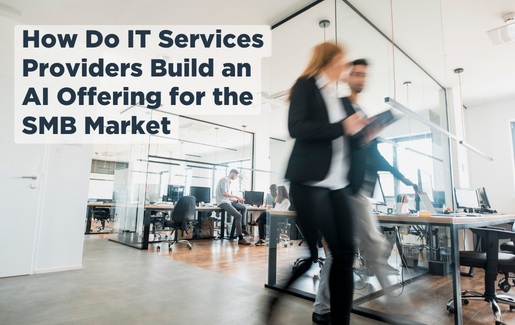 Many people are discussing artificial intelligence (AI) like it is another hype cycle. I think it is more transformative than that. Five years ago, Minouche Shafik, the president of Columbia University said, “In the past jobs were about muscles, now they’re about brains, but in the future they’ll be about the heart.” This was four years before ChatGPT was launched.
Many people are discussing artificial intelligence (AI) like it is another hype cycle. I think it is more transformative than that. Five years ago, Minouche Shafik, the president of Columbia University said, “In the past jobs were about muscles, now they’re about brains, but in the future they’ll be about the heart.” This was four years before ChatGPT was launched.
I believe that AI is ushering in a third age of work where things like heart and creativity are the value that humans bring to work. Just as we were able to transition a lot of our work to mechanical devices, we will now be able to transition many of our processing, analyzing and communicating tasks to AI. Just like physical labor and machines, thinking will never be fully replaced by AI but a large percentage of it will be over time.
So how does this align with the role of technology service provider and the businesses they serve? First, as early adopters of various types of technology, we have seen AI and machine learning (ML) emerge in the space to help the MSP with many of their everyday tasks. It has been used for threat detection, predicting failures based on data, performing help desk tasks and crafting better communications between technicians and end users. It has also helped them increase efficiencies, leverage less technical service desk employees and create better client experiences.
Scalability, Automation and Other Benefits
For SMBs, AI implementation translates to tangible benefits. It drives cost savings through operational efficiencies and opens avenues for data-driven decision-making. Enhanced customer experiences lead to increased loyalty and revenue, while scalable AI solutions support business growth. The scalability piece works the same with AI as it did with the transition to machines in the industrial age. More consistent and predictable work output freeing the humans to do the more complex tasks that AI will never be able to do.
Some common improvements can be found in:
- Automating routine operations: Streamlining everyday tasks, from scheduling to data entry
- Data management and analytics: Offering deeper insights into customer behavior, market trends and operational efficiencies
- Enhanced cybersecurity measures: Using AI to predict and mitigate security threats
- Improved customer service: Deploying AI chatbots for 24/7 customer engagement
- Marketing and sales optimization: Personalizing marketing efforts and optimizing sales strategies
- HR and recruitment efficiency: Streamlining the recruitment process with AI-driven tools
Starting Spots: Vertical Markets, Common Problems
So where does an IT services provider begin when looking to add AI services to their stack? First, look at the verticals you serve, some are ready for disruption utilizing AI. Some examples include retail/e-commerce, manufacturing, marketing, agriculture and professional services like law and accounting.
There are some notable industries missing from the list like healthcare and financial services, where although I believe AI can be leveraged although there are higher compliance requirements. If you specialize in these areas and know the compliance needs, you should also look to leverage AI here.
I started with industry vertical for two reasons:
- They have common problems, and you probably have specialized knowledge if you are serving multiple clients in the same industry.
- It is the scalability of commonality and the advantage of specialized knowledge that give you the edge.
The next step is to find the common problem to solve. Interview your clients or survey them to find out if they have a similar problem that they can solve with AI. For example, in manufacturing some of the common AI opportunities might be:
- Predicting machinery failure or disruption by analyzing real-time or collected data
- Production planning and scheduling by automatically analyzing constraints and suggesting optimal pathways
- Process automation to handle repetitive tasks, freeing up humans for more complex or strategic work
- Real-time decision-making with large amounts of data that can be collected from a production floor increasing productivity, safety and efficiency
Once you find a list of common problems to solve, how does a service provider evaluate if they are the right candidate to leverage AI? Use the following list of questions against each problem on the list:
- Is the task repetitive?
- Is the task time consuming?
- Is there a benefit or gain due to real-time processing and decisions?
- Does the task rely on data, especially large amounts of data?
- Is there an element of pattern recognition?
- Does the task follow a standard process or a series of steps?
- Is the task scalable?
- Is successful completion of the task defined and measurable?
The problem with the most “yes” answers wins.
As a technologist it is your job to find or create the solution using AI and then to properly manage it for process improvement. There are many tools out there and many more being developed every day. It is up to us to curate the right ones for our clients, but also to create opportunities for your business to increase value, revenue and profit.
How to Manage the Value and Ethics of AI
One last observation is the importance of addressing the ethical and privacy concerns in the transformative journey of any emerging technology, especially AI. As with all new technologies, AI brings its own set of challenges. Systems can perpetuate existing biases, particularly in sensitive areas like HR, if they rely on historically biased data. Additionally, the substantial data requirements for AI operation raise significant privacy issues. Ensuring data security and confidentiality is not just a technical necessity, but a moral imperative.
MSPs must commit to designing AI solutions with ethics, emphasizing transparency, accountability and adherence to robust data governance policies. This approach is crucial to ensure that the advancements in AI are not only innovative but also responsibly and equitably aligned with societal values. It's a critical step in maintaining trust and integrity in AI applications and is indicative of the thoughtful navigation required in the evolution of any new technology.
A Gateway to New Realms of Innovation
In conclusion, as we navigate this exciting era of AI, it's clear that its impact transcends mere technological advancement; it signifies a fundamental shift in how we approach work and value human creativity and emotional intelligence. For MSPs and SMBs, AI is not just a tool for efficiency but a gateway to new realms of innovation and human-centric services.
By embracing AI, service providers can not only revolutionize their offerings but also empower businesses to focus on what truly matters—the uniquely human aspects of creativity, empathy and strategic thinking. As we continue to harness the power of AI, let us remember that it is not about replacing human potential but amplifying it, paving the way for a future where technology and humanity converge for greater progress and prosperity.
Get More AI Insights
From bias to privacy to data provenance to accuracy, there are many facets to consider using artificial intelligence. Get more information and guidance to help you avoid problems down the road. Download Ethically Operationalizing AI and Machine Learning now.

 Add CompTIA to your favorite RSS reader
Add CompTIA to your favorite RSS reader

